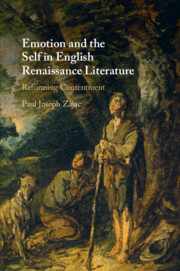Book contents
- Emotion and the Self in English Renaissance Literature
- Emotion and the Self in English Renaissance Literature
- Copyright page
- Dedication
- Contents
- Acknowledgments
- Introduction
- Chapter 1 Constructing Contentment in Reformation England
- Chapter 2 Romancing Contentment
- Chapter 3 Fashioning Contentment
- Chapter 4 Performing Contentment
- Chapter 5 Losing Contentment
- Conclusion
- Notes
- Bibliography
- Secondary Sources
- Index
Chapter 5 - Losing Contentment
Affect, Environment, and Empire in Milton’s Paradise Lost
Published online by Cambridge University Press: 15 December 2022
- Emotion and the Self in English Renaissance Literature
- Emotion and the Self in English Renaissance Literature
- Copyright page
- Dedication
- Contents
- Acknowledgments
- Introduction
- Chapter 1 Constructing Contentment in Reformation England
- Chapter 2 Romancing Contentment
- Chapter 3 Fashioning Contentment
- Chapter 4 Performing Contentment
- Chapter 5 Losing Contentment
- Conclusion
- Notes
- Bibliography
- Secondary Sources
- Index
Summary
Chapter 5 illuminates the literary, political, and ecological significance of Milton’s depiction of contentment. In Eikonoklastes, Milton responds directly to the appropriation of contentment discourse in Eikon Basilike. Charles I had identified his opponents as malcontents and positioned himself as a contented martyr-king. By contrast, Milton describes Charles’s discontent as the immediate cause of the English Civil War and as the epitome of tyranny. In Paradise Lost, he adds an environmental dimension to the religious and republican significances of content and discontent. The language of self-containment has limited applications for unfallen Adam and Eve, who interact harmoniously with their environment. Satanic discontent reconstitutes the experience of selfhood as a space defined in opposition to the natural world. Satan perverts contentment and finds it impossible to relate to the world around him in any way other than as a conqueror. When Adam and Eve choose to sin, they emulate diabolic discontent and subject all of creation to imperialism. Milton’s revision of Christian contentment reveals his efforts to endure, lament, and resist the Restoration.
Keywords
- Type
- Chapter
- Information
- Emotion and the Self in English Renaissance LiteratureReforming Contentment, pp. 125 - 152Publisher: Cambridge University PressPrint publication year: 2022

